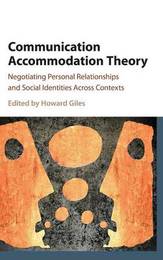
|
Communication Accommodation Theory: Negotiating Personal Relationships and Social Identities across Contexts
Hardback
Main Details
| Title |
Communication Accommodation Theory: Negotiating Personal Relationships and Social Identities across Contexts
|
| Authors and Contributors |
Edited by Howard Giles
|
| Physical Properties |
| Format:Hardback | | Pages:230 | | Dimensions(mm): Height 235,Width 158 |
|
| Category/Genre | Sociolinguistics |
|---|
| ISBN/Barcode |
9781107105829
|
| Classifications | Dewey:302.3 |
|---|
| Audience | | Professional & Vocational | |
|---|
| Illustrations |
5 Tables, black and white; 3 Line drawings, black and white
|
|
Publishing Details |
| Publisher |
Cambridge University Press
|
| Imprint |
Cambridge University Press
|
| Publication Date |
18 August 2016 |
| Publication Country |
United Kingdom
|
Description
Most people modify their ways of speaking, writing, texting, and e-mailing, and so on, according to the people with whom they are communicating. This fascinating book asks why we 'accommodate' to others in this way, and explores the various social consequences arising from it. Communication Accommodation Theory (CAT), revised and elaborated over the past 40 years, has been applied to a wide range of situations, from families to courtrooms, and from media to hospitals, by means of diverse methodologies in many disciplines, and across numerous languages and cultures. Bringing together a team of experts, this book demonstrates how the theory can help us towards a greater understanding of interpersonal communication in a multitude of contexts. Finally, it examines the principles of the theory, identifying a range of avenues along which research can move forward in future.
Author Biography
Howard Giles is Professor of Communication at the University of California, Santa Barbara, and Honorary Professor in the School of Psychology, University of Queensland, Brisbane.
Reviews'This long-awaited collection of new perspectives on Communication Accommodation Theory (CAT), edited by Howard Giles, whose name is synonymous with CAT, is most welcome. The chapters contributed by leading international scholars include cutting-edge research on theoretical issues, and both quantitative and qualitative methodology, as well as richly exemplified discussion of intergroup and organizational dimensions. This volume will be embraced with enthusiasm by the many research students and scholars who have found CAT invaluable in enriching their understanding of communication across diverse contexts, cultures and social groups.' Janet Holmes, Emeritus Professor, Victoria University of Wellington
|